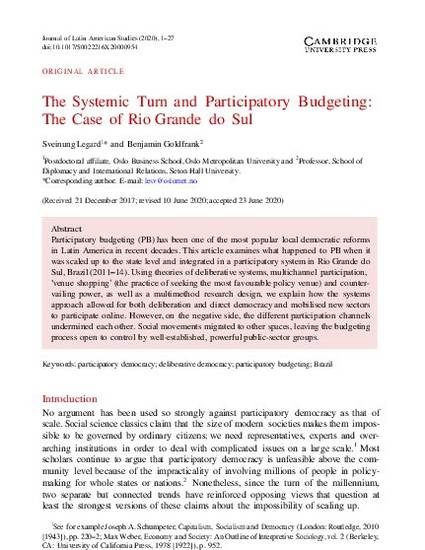
Article
The Systemic Turn and Participatory Budgeting: The Case of Rio Grande do Sul
Journal of Latin American Studies
(2020)
Abstract
Participatory budgeting (PB) has been one of the most popular local democratic reforms in Latin America in recent decades. This article examines what happened to PB when it was scaled up to the state level and integrated in a participatory system in Rio Grande do Sul, Brazil (2011–14). Using theories of deliberative systems, multichannel participation, ‘venue shopping’ (the practice of seeking the most favourable policy venue) and countervailing power, as well as a multimethod research design, we explain how the systems approach allowed for both deliberation and direct democracy and mobilised new sectors to participate online. However, on the negative side, the different participation channels undermined each other. Social movements migrated to other spaces, leaving the budgeting process open to control by well-established, powerful public-sector groups.
Keywords
- participatory democracy,
- deliberative democracy,
- participatory budgeting,
- Brazil,
- democracia participativa,
- democracia deliberativa,
- presupuesto participativo,
- Brasil,
- orçamento participativo
Disciplines
Publication Date
October 9, 2020
DOI
10.1017/S0022216X20000954
Citation Information
Benjamin Goldfrank and Sveinung Legard. "The Systemic Turn and Participatory Budgeting: The Case of Rio Grande do Sul" Journal of Latin American Studies (2020) ISSN: 1469-767X Available at: http://works.bepress.com/benjamin_goldfrank/37/
